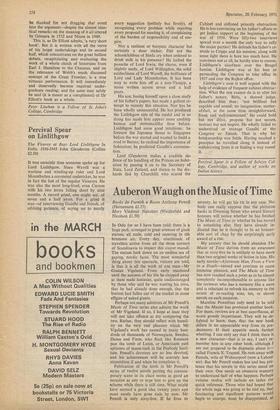Peter Linehan on Dr Elliott's lectures
The Old World and the New, 1492.1650 I, H. Elliott (cup paperback 60p) br Elliott is a leading authority on the his- tory of early modern Europe. In The Revolt of the Catalans, he produced a piece of fun- damental research in a thoroughly readable fo�form, and made English historians more fullY aware of the activity of the once thriving school of Jaime Vicens Vives at Barcelona. In Imperial Spain and Europe Oivided, he has shown how to interpret the research of others, in lucid and elegant narrative. And now he has reached out from this base, choosing as the subject of last year's Wiles Lectures the impadt of the New World on the consciousness of the Old. As before, he carried his audience (and, now that they are published, his readers) along with greatest of ease, so that only the most erudite of them could even guess at the quantity of often barren research Which must have gone into his labours. As the cliché says, he wears his learning lightly. Professor Elliott's calculations suggest that that impact was minimal. 'Ironically' (and characteristically), he concludes, the very success of Europeans overseas—to wit, of Spaniards in •the Americas, with which he is almost exclusively concerned—ren- dered them proof against being appreciably influenced by the experience and its impli- cations—and only an imperial historian will be competent to test the irony of that. As early as 1524 a native of Cordoba had realistic:I that, having been at the ends of the earth for centuries, his city was now at its centre. Yet nothing happened. Many of the most perceptive observations of the new- comers remained unpublished for centuries. Philip tit was considerably less conscious of the importance of the geopolitical switch from a Mediterranean to an Atlantic com- munity than his historians would have us believe. 'Everything is very different', wrote Tomas de Mercado, a friar who had been there, in the 1570s. And so it is still in the 1970s, to judge by the felix culpa of the typesetter who perpetrates Beunos Aires twice on a single page.
That unique lapse epitomises the theme of the book: the failure of contemporaries to comprehend the importance of the land- fall of 1492. Columbus himself received short shrift from sixteenth-century writers. Their world-view was not much affected. The effect of his exploits struck the follow- ing generation as having been that of giving `to those strange lands the form of our own'.
If there was any sense of reciprocity, at least recorded, then it has escaped Dr Elliott's attentions. We may assume that there was none. Why, then, such peculiar unreceptiveness? In search of an answer, Dr Elliott ranges far and wide. He con- siders the closed mind of Renaissance man, enslaved by the texts of classical antiquity; he explores colonialism at work in seventh- century China. It is a fascinating investiga- tion. But might he not have indulged his passion for parallels nearer home, where indifference begins, in Spain itself? After all, the peninsular Reconguista had ended only a matter of weeks before Columbus set off. True, he gives us the gist of Dr Southern's book on the subject; but in a single sentence only, and not even Dr Southern would lay claim to have written other than a (brilliant) essay on an enor- mous subject. For centuries Christians, both Spanish and foreign, had displayed in their dealings with Islam those very attitudes which are Dr Elliott's concern. Caelum non animum mutant qui trans mare currant; and Dr Elliott's failure to pursue this line of inquiry is, perhaps, the one source of disappointment in the first volume of a series which has among its aims that of tracing 'the continuity of mediaeval ideas' in the early modern period. In the year when new planets were visited he may, however, be thanked for not dragging that event into the argument—despite the almost idenq tical remarks on the meaning of it all uttered by Gomara in 1552 and Nixon in 1969.
This is, as Dr Elliott admits, `a very short book'. But it is written with all the verve of his larger undertakings and its second half, which concentrates on the great bullion debate, recapitulating and evaluating the work of a whole clutch of historians from Earl J. Hamilton to the Chaunus, and on the relevance of Webb's much discussed concept of the Great Frontier, is a true virtuoso performance. It will immediately and deservedly become required under- graduate reading; and the same may safely be said (it is meant as a compliment) of Dr Elliott's book as a whole.
Peter Linehan is a Fellow of St John's College, Cambridge



































 Previous page
Previous page